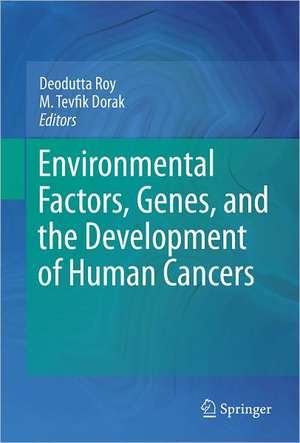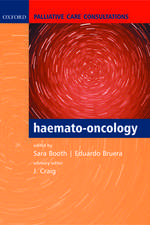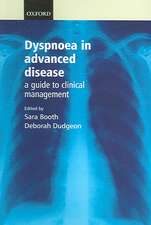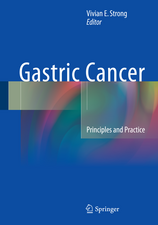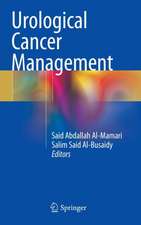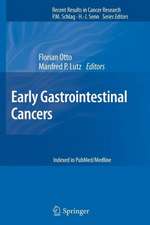Environmental Factors, Genes, and the Development of Human Cancers
Editat de Deodutta Roy, M. Tevfik Doraken Limba Engleză Hardback – 16 sep 2010
| Toate formatele și edițiile | Preț | Express |
|---|---|---|
| Paperback (1) | 1107.41 lei 6-8 săpt. | |
| Springer – 19 oct 2014 | 1107.41 lei 6-8 săpt. | |
| Hardback (1) | 1113.11 lei 6-8 săpt. | |
| Springer – 16 sep 2010 | 1113.11 lei 6-8 săpt. |
Preț: 1113.11 lei
Preț vechi: 1171.68 lei
-5% Nou
Puncte Express: 1670
Preț estimativ în valută:
212.99€ • 232.09$ • 179.48£
212.99€ • 232.09$ • 179.48£
Carte tipărită la comandă
Livrare economică 23 aprilie-07 mai
Preluare comenzi: 021 569.72.76
Specificații
ISBN-13: 9781441967510
ISBN-10: 1441967516
Pagini: 520
Ilustrații: XIII, 520 p.
Dimensiuni: 155 x 235 x 28 mm
Greutate: 0.89 kg
Ediția:2010
Editura: Springer
Colecția Springer
Locul publicării:New York, NY, United States
ISBN-10: 1441967516
Pagini: 520
Ilustrații: XIII, 520 p.
Dimensiuni: 155 x 235 x 28 mm
Greutate: 0.89 kg
Ediția:2010
Editura: Springer
Colecția Springer
Locul publicării:New York, NY, United States
Public țintă
ResearchDescriere
Cancer is a complex disease. Only 5-10% of human cancers are hereditary in nature. Many of us think of environmental agents when we think of carcinogens. The environment includes all that surrounds us, and environmental influences include not only chemical, physical and biological toxicants, but also diet and lifestyle. In this broadest sense, the environment contributes substantially in the development of human cancer. This book will describe how environment contributes to malignant transformation leading to profound changes in the genetic and signaling networks that control the functioning of the cell. It will critically discuss the understanding of the effects of environment on the development, progression and metastasis of cancer with current knowledge of the signaling networks that support functioning of transformed human cells. Genes and environmental factors that influence the origins of cancer are not necessarily the same as those that contribute to its progression and metastasis. Susceptibility gene variants for each specific cancer are being identified with emerging evidence of gene–environment interaction. Gene-environment interactions will be discussed through each specific cancer-based approach to address the question of how genetic variations can influence susceptibility to the individual type of cancer. It will also highlight and summarize epigenetic changes that increase the risk for susceptibility to a particular type of cancer, particularly in the presence of specific environmental factors. Thus, this book will contain chapters from the world’s experts focused on the current evidences that support the role of environment in the cancer etiology and in the growth of malignant lesions, and discuss who may be susceptible to environmental influences.
Cuprins
Table of Contents Section 1General Principles1) Environmental Factors, Genes, and the Development of Human Cancers - Deodutta Roy and M. Tevfik Dorak2) Gene-environment Interactions, Phenotypic Changes, and Human Health - Kenneth Olden3) Statistics for Testing Gene-Environment Interaction - Momiao Xiong and Xuesen Wu 4) Clustering Studies for Identifying the Role of Environmental Factors in Etiology of Human Cancers - Richard J.Q. McNally5) Application of Bioinformatics and Cancer - Changwon Yoo 6) Environment and Vascular Changes in Malignant Tissues - Quentin Felty7) Epigenetic Changes in Cancer: Role of Environment - Zdenko Herceg and Paolo Boffetta 8) Approaches to Identify Environmental and Epigenomic Components or Covariates of Cancer and Disease Susceptibility- Alok Deoraj and Deodutta RoySection 2Environment and Specific Types of Cancer9) Gene-environment Interaction and Susceptibility to Pediatric Brain Tumors - Brian Kunkle, David Sandberg, Prasanna Jayakar, Quentin Felty, Deodutta Roy10) Genetic Polymorphisms Predisposing Individuals to Breast Cancer via Gene-environmental Interaction - Keun-Young Yoo, Sue K. Park, Aesun Shin11) Environment, Genetic Immunology and Childhood Cancer - Esma Ucisik-Akkaya and M. Tevfik Dorak12) Exposure to Environmental Mutagens: APC and colorectal carcinogenesis - Aruna S. Jaiswal, Melissa L. Armas, Shahnjayla K. Connors, Harekrushna Panda, Satya Narayan 13) Gene-environment Interactions and Susceptibility to Liver Cancer - John B. Colerangle14) Genetic Epidemiology of Mismatch Repair Deficiency in Ovarian Cancer - Tuya Pal, Jenny Permuth Wey, Thomas A. SellersSection 3Case Studies 15) Chewing Betel Nut and Oral Cancer - Yashmin Choudhury and R. N. Sharan16) Birth Weight and Cancer Associations - Nadia Barahmani and M. Fatih Okcu17) Iron Excess and Cancer - Charronne F. Davis and M. Tevfik Dorak- Official Symbols and Full Names for Genes Mentioned in the Book by Their Popular Aliases- Basic Biostatistic, Epidemiologic and Genetic Concepts in Genetic and Environmental Epidemiology of Cancer
Textul de pe ultima copertă
Cancer is a complex disease. Only 5-10% of human cancers are hereditary in nature. Many of us think of environmental agents when we think of carcinogens. The environment includes all that surrounds us, and environmental influences include not only chemical, physical and biological toxicants, but also diet and lifestyle. In this broadest sense, the environment contributes substantially in the development of human cancer. This book will describe how environment contributes to malignant transformation leading to profound changes in the genetic and signaling networks that control the functioning of the cell. It will critically discuss the understanding of the effects of environment on the development, progression and metastasis of cancer with current knowledge of the signaling networks that support functioning of transformed human cells. Genes and environmental factors that influence the origins of cancer are not necessarily the same as those that contribute to its progression and metastasis. Susceptibility gene variants for each specific cancer are being identified with emerging evidence of gene–environment interaction. Gene-environment interactions will be discussed through each specific cancer-based approach to address the question of how genetic variations can influence susceptibility to the individual type of cancer. It will also highlight and summarize epigenetic changes that increase the risk for susceptibility to a particular type of cancer, particularly in the presence of specific environmental factors. Thus, this book will contain chapters from the world’s experts focused on the current evidences that support the role of environment in the cancer etiology and in the growth of malignant lesions, and discuss who may be susceptible to environmental influences.
Caracteristici
This book addresses the effects of environment on the etiology, development and the susceptibility of human cancer.
Includes supplementary material: sn.pub/extras
Includes supplementary material: sn.pub/extras
